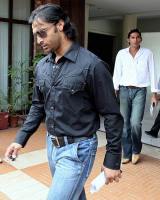
|

Shoaib Akhtar and Mohammad Asif: uncertain futures
© Getty Images
|
|
In the run-up to the final verdict of the drugs tribunal on the charges laid against Shoaib Akhtar and Mohammad Asif, few bets were placed on the outcome. Some predicted harsh punishment. Others, cynically mindful of the nature of internal inquiries, thought lenient judgments would emerge, based possibly on technicalities and legal loopholes. After reading the report, however, few can argue that in accepting the tribunal's recommendations of a two-year ban for Shoaib and a one-year one for Asif, the correct decision has been taken by the PCB.
Mundane and plodding as such reports often are, this one is a must-read. Forget for a moment the minutiae and assess it as a whole. Broadly taken, it reveals a comprehensive and fair trial for both players, one where both were offered the fullest opportunity to defend themselves. Once digested, you cannot help, on the evidence presented, but conclude that a just verdict has been reached. Firm no doubt, but fair nonetheless.
In the details though, there is significance: on basis of the statements they provided, neither player conjured a satisfactory explanation, not even - some will note - that their mothers provided them with the medication. Shoaib's experience, the fact that he was a signatory to a drugs awareness programme the PCB organised in 2002, worked against him. He delayed in giving a sample, admitted to using an array of supplements, vitamins and medication, some of which he didn't name. He was vague about whom he sought advice from for taking such prescriptions, claimed he hadn't seen WADA's list of banned medication provided to players and has regularly sought medical help from outside the PCB. In short, he hasn't helped his case.
Asif's background, his inexperience and his ignorance, on the other hand, has aided him. He wasn't part of the last drugs awareness programme and there appears to be some doubt about whether he received the list of banned substances. The tribunal concluded, a touch bewildered, that he probably wouldn't be able to comprehend such documentation anyway. He admitted using a protein supplement but stopped when he was told to lay off by the team's physiotherapist, but couldn't provide any defence otherwise.
Firm and fair it is, but deeply depressing also. The temptation exists to say, in Shoaib's defence, that his body is a uniquely fragile creation, wracked by genetic disabilities, worsened by the rigours of bowling at a pace few have equalled. He said just before the Champions Trophy that he dreamed of playing just one day without pain, an admission now simultaneously haunting and revelatory. The pressures of staying fit or recovering from an injury, on such a being, are unfathomable.
There remains now only a bare sense of fulfillment about a career even rock stars might think excessive, blotted as it is by injuries, suspect action, disciplinary problems and now a drugs ban. We thought he had finally settled after that astounding series against England and yet, not for the first time, we were all wrong. At 31, a two-year ban is as awful as it sounds and the fear is that his career will remain unfulfilled. Some will say good riddance, others will mourn his absence; rarely has it been different.
The tragedy with Asif is of a different kind, though tragedy it is. At the age of 23, a one-year ban is no end, but the stain will persist in every article, discussion and interview about him from hereon in. By all accounts, a potentially wondrous career awaited him, a fast bowler unique still in a country that has produced some of the breed's greatest. That he will return is not doubted but how he will respond, only he will know.
Finally, as odd as it feels, the PCB deserve tribute. Once the results of the tests had arrived, they acted swiftly. Both players were immediately called back, therefore sparing unplanned embarrassment at the hands of an ICC dope test. An independent tribunal was immediately set up and, but for an unusually long break for Eid, a verdict was reached in good time.
And face it, if a way was found to spare their two premier strike bowlers - on current form among the best in the world - you would not have been wholly surprised. Disgusted perhaps at the lack of justice, but not altogether shocked. So for accepting the tribunal's findings, further praise. Anything less would not only have been an abominable precedent for younger players, it would have reflected poorly on Pakistan and cricket in general.
Lest the board get carried away though, they should be directed immediately to point 35 of the report, which minces no words in condemning the PCB's unsatisfactory manner in advising and cautioning its players in doping matters. "We have found much 'passing of the buck' between the various PCB officials who have appeared before us," they admonish. Therein lies the tale: Yes, the crisis was handled well eventually, but really it might not be altogether bad if such crises were prevented from arising in the first place.
Osman Samiuddin is Pakistan editor of Cricinfo
